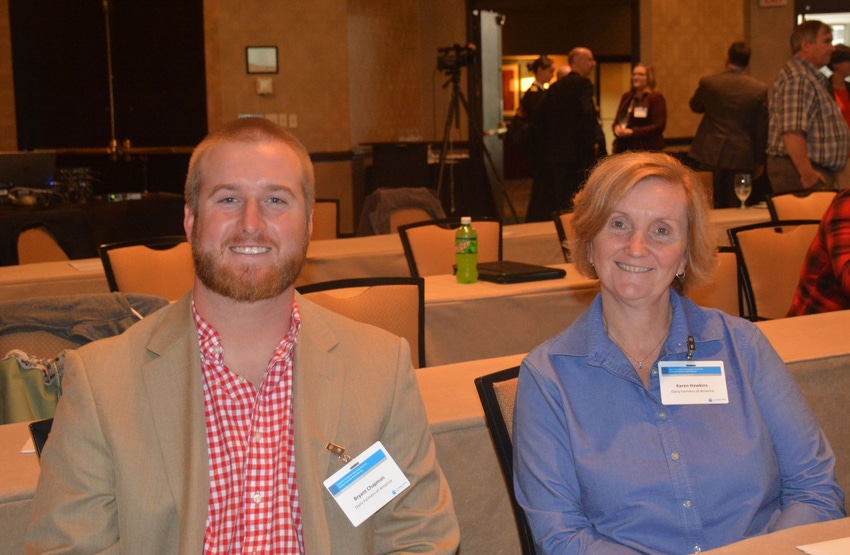
Two farmers told a public hearing sponsored by the Food and Drug Administration that biotechnology allows farmers to increase yields while using less fuel, less chemicals and with less impact on the environment.
Bryant Chapman, a dairy, beef, poultry and grain farmer in Alexander County, N.C., and Don Duvall, a grain farmer from Carmi, Ill., both emphasized that biotechnology allows farmers to produce abundant and affordable food with less inputs.
The FDA public hearing was held Nov. 7 at the Omni Hotel in downtown Charlotte. The hearing was part of the Agricultural Biotechnology Education and Outreach Initiative passed by Congress, which appropriated $3 million for FDA to work with USDA to educate the public on agricultural biotechnology and food and animal feed ingredients derived from biotechnology. Another hearing is set for Nov. 14 in San Francisco.
Chapman, testifying on behalf of Dairy Farmers of America, said the environmental footprint of farming has been significantly improved thanks to biotechnology. “These benefits are very consistent with things that consumers tell us are important to them which is high quality food that is affordable and grown in ways that conserve our natural resources and chemical use,” Chapman said. “It’s very clear that most consumers aren’t making the connection between what and how GMOs help accomplish that.”
Chapman said farmers need to both listen to consumers and share their personal stories to help them understand the importance of biotechnology to agriculture. He emphasized that genetically modified organisms, or GMOs, provide huge opportunities to help reduce food insecurity, especially in the developing world where safe options currently aren’t available to protect crops against diseases and pests.
”We can make an impact by proving that biotechnology helps in the United States where we have the ability to use it and practice it safely. If we don’t engage with the consumes in the United States then we can see a potential life threatening ripple effect by losing these technologies and not being able to use them in developing countries,” Chapman said.
As a dairy farmer, Chapman acknowledged that milk is not bioengineered, but he stressed that much of the grain he feeds his cattle is bioengineered. He said widespread marketing against GMO concerns him.
“Many food companies are labeling and promoting products that are non-GMO or organic or things of the like and are trying to reinforce confused consumers that GMOs or biotechnology as a whole are things that they need to avoid. And that’s just not the truth,” Chapman said. “As a dairy farmer I welcome efforts led by the FDA that will lead to better informed consumers with a greater awareness on the implications of food choices and a stronger foundation when they make food decisions.”
While milk is not a GMO-crop, Chapman said dairy farmers are still challenged by “marketing gimmicks” when milk is labeled as containing no antibiotics. He emphasized that no milk can leave a farm if antibiotics are found.
He used the antibiotic issue in milk as one example of deceptive marketing that harms farmers and makes it appear the crops they produce are unsafe or harmful. “In all reality our goal day in and day out is to make sure we produce the safest food available for anybody to consume,” he said.
Chapman said many people opposed to GMOs and biotechnology are using social media as a platform to attack those who are conventionally producing crops. He called on USDA and FDA to get out the true facts on GMOs and biotechnology to counter the deceptive attacks.
“I’m not a communications or consumer research expert, but as a farmer I know the importance of telling a story of my farm to my neighbors and my community. I hope FDA will be able to work with real people with real stories who can help reach consumers with accurate trustworthy information that is also grounded in science,” Chapman said.
Duvall, testifying on behalf of the National Corn Growers Association, said it is important for FDA and other agencies to reassure consumers that their food is safe. He emphasized that genetically modified crops are extensively tested by multiple agencies.
“For the more than two decades that genetically modified products have been grown there has not been a single documented incident of harm to human health resulting from genetic modification,” he said. “GMOS reduce the impact of agriculture on the environment. We’re using less fuel, less chemicals, less inputs and that results in a healthier environment.”
About the Author(s)
You May Also Like






